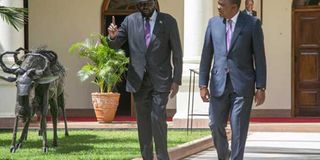Pan-Africanism can be revived by opening African borders

President Uhuru Kenyatta holds talks with his South Sudan counterpart Salva Kiir at State House, Nairobi on November 29, 2017. PHOTO | PSCU
What you need to know:
- African independence leaders believed in the emancipatory power of unity of African people on the continent and in the diaspora.
- Pan-Africanism wilted in the harsh glare of the triple dreams of African independence — nation-building, development and regional integration.
- The promise of people’s Pan-Africanism also transcends the newly-found fiscally driven love of the diaspora by African countries.
- African governments have come to appreciate their national diasporas as a remittance pipeline.
As I listened to President Uhuru Kenyatta’s inauguration speech on Tuesday, I found his remarks on immigration particularly intriguing. He announced that “any African wishing to visit Kenya will be eligible to receive a visa at the port of entry.”
Members of the East African Community “will be treated like Kenyans. Like your Kenyan brothers and sisters, you will need only your identity card. You can now work, do business; own property, farm and if you wish, and find a willing partner, you can marry and settle in Kenya.” Remarkably, both commitments were made “with no conditions for reciprocity.” It was a rare homage to Pan-Africanism.
Pan-Africanism has been an enduring dream among African thought leaders ever since the dispersal of African peoples through the barbarisms of the Atlantic and Indian Ocean slave trades, the dismantling of African polities through colonisation, and the destabilisations of independence by neo-colonialism and globalisation.
POWER OF UNITY
African independence leaders believed in the emancipatory power of unity of African people on the continent and in the diaspora.
But Pan-Africanism wilted in the harsh glare of the triple dreams of African independence — nation-building, development and regional integration.
To be sure, the Organisation of African Unity, the predecessor of the African Union, regional economic communities, inter-governmental agencies, and other organs to promote African unity were created.
However, the ideals of the heady days of decolonisation shrivelled into the empty Pan-African pageantry of presidential summits.
CONFLICTS
Peoples’ Pan-Africanism degenerated into the voyeurism of occasional football tournaments, Big Brother Africa, and the unwanted flows of refugees fleeing from conflicts and dictatorships.
This is why President Kenyatta’s Pan-African commitment was significant. It represented a pursuit of Pan-Africanism, one that valorises the mobility of people as much as the circulation of capital and commodities.
The promise of people’s Pan-Africanism also transcends the newly-found fiscally driven love of the diaspora by African countries.
African governments have increasingly come to appreciate their national diasporas as a remittance pipeline. From 2000 to 2007, remittance flows to the continent increased by more than 141 per cent.
AFRICAN MIGRANTS
In 2010, remittances sent by the 31 million international African migrants reached nearly $40 billion, equivalent to 2.6 per cent of Africa’s GDP; and climbed to $66 billion in 2014, led by Nigeria ($20.8 billion) and Egypt ($20.4 billion). This was higher than FDI inflows. Thus, the diaspora is Africa’s biggest foreign investor.
The irony is that while African diasporas in the Global North are increasingly seen as conduits of developmental “brain gain” or “brain circulation,” even if discourses of “brain drain” persist, intra-African Diasporas tend to be dismissed as undesirable immigrants. To be sure, intra-African migration is huge.
Altogether, in 2015 there were 21 million international African migrants (8.6 per cent of the global total of 244 million) up from 15 million in 2000. However, most of these went to other African countries as refugees.
The failure to openly welcome and productively integrate immigrants from other countries deprives the continent of a valuable resource.
CIVIC BENEFITS
The economic and educational benefits of more open migratory flows across Africa are indisputable. Less obvious, but no less important, are the potential civic benefits.
Migrations are not only deeply etched on the African historical landscape, they offer opportunities for dissolving the stubborn legacies of the colonial ethic, social and cultural polarisations and exclusions.
They can help lift the crusty and suffocating lids of the inherited boundaries of the colonial State and balkanization.
Colonialism brought together people who had been separate and separated people who had been together, in the memorable phrase of Ali Mazrui, the great Kenyan intellectual. The Pan-Africanist project seeks to reverse African colonial divisions and reclaim African unity.
Prof Zeleza is the Vice Chancellor, USIU-Africa. [email protected]




